This speech was originally given as an off-the-cuff speech for the Lean In Beijing Second Year Anniversary Brunch at Palms LA in Liangmaqiao, and then posted on the Lean In Beijing WeChat account (follow at WeChat id: leaninbeijing) on Wednesday, July 29, 2015; please forgive any inconsistencies.
Life is far better when you extend a hand: The power of passing it on
I was just speaking with Alicia; her story inspired me, and made me think—we’ve all really been creating our own “lean in moments” for a long time. Every time we make a decision that takes courage, when we do something that’s a right decision for ourselves—we’re having a “lean in moment.”
I’ve now lived in Beijing for over three years, and my experiences with Lean In Beijing have helped me find and secure my “dream job,” and has allowed me to develop some of my most treasured relationships. But better still, these experiences and relationships have shown me the values, qualities, and character I want to express and embody in my own life.
The biggest takeaway in my Lean In experience is that life is far better when you extend a hand.
I read the original book Lean In while on vacation in the States, and loved it so much that I shared it with my Chinese girlfriends back where I was living in Beijing. I lent the book to friends and blogged about their reactions to the text. One of the original co-founders told me about a potential Lean In Beijing group forming when I told her about my blog. She immediately extended an invitation and said to come along to the first meeting—that’s the power of passing it on.
Life is far better when you extend a hand—and we are more powerful when we support each other than if we try to tear each other down.
The Nigerian-American feminist author Chimamanda Ngozi Adichie, whose TED talk “We Should All Be Feminists” was famously sampled on Beyonce’s ***Flawless, says, “We raise girls to see each other as competitors.”
We can see this highly dramatized in Hollywood movies such as Mean Girls, but it can happen so much more subtly in our own individual relationships.
Have you ever gotten jealous over someone else’s success? Tried to compete with other women over a guy? We’ve all been in “Mean Girl” situations.
Through my experiences and personal relationships I’ve developed with these women (gesturing to the women in the room), I’ve seen the power of collaborative relationships—the strength in supporting each other, rather than working to tear each other down.
There are so many practical ways we can support each other—forwarding and circulating potential job posts, revising work such as resumes, speeches, and other writing, connecting friends with potential interviewers, mentors, and other valuable connections. Pulling people into your network not only supports them, but it strengthens you. One of the biggest ways that I’ve seen how we can “extend a hand,” and pass it on, is simply to be inclusive and loving, supporting others in the ways that we’d like to be supported.
We joke as a group, because we say in our first year as Lean In Beijing, all of us left our jobs or found new ones. I ended up finding my “dream job,” not only through the emotional support of the group, but also through their practical guidance and support.
I want to also emphasize and celebrate the importance of including men in this extension. It was the actions of many men that helped me lean in. In particular, it was the practical support of two former male coworkers that showed me what I needed to do to find the next right job for me on my career path.
One in particular was patient enough to offer his insights and advice through the job hunt. He provided me connections to different agencies. He helped review and revise my resume. When I did get the interviews, he had me call him and coached me through a mock interview process—what a way to lean in together. That’s the power of passing it on.
One of his favorite topics to discuss was the salary package—and how to negotiate to get what you want. He showed me why I needed to ask for more, how much I should be asking for, and how to effectively stand up for myself and my needs.
It was being on the receiving end of these selfless acts that today, one of my greatest joys is being able to pass it on–helping others by sharing the knowledge and insights I have gained thus far from being a young professional working abroad.
It’s an act of power to extend a hand—and passing on your own knowledge and experiences only allows for more gratitude and abundance for you.
Instead of seeing each other as competitors, we can see each other—the entire brotherhood and sisterhood of humankind—as collaborators and teammates as we lean in together.
Find others’ Lean In Stories and more about Lean In Beijing on their WeChat account; follow at WeChat id: leaninbeijing.









